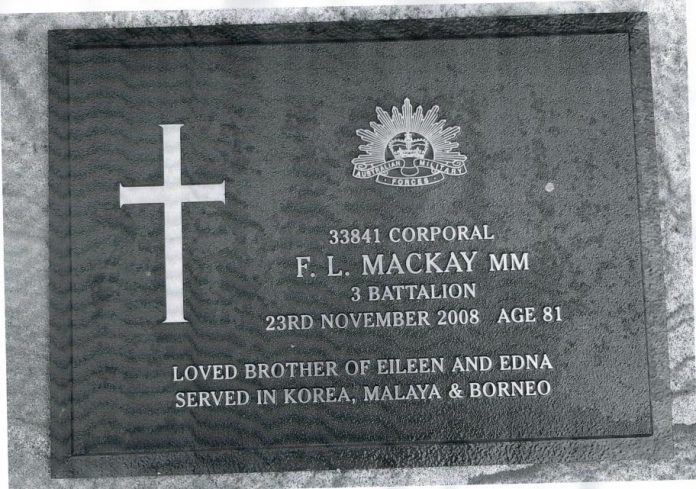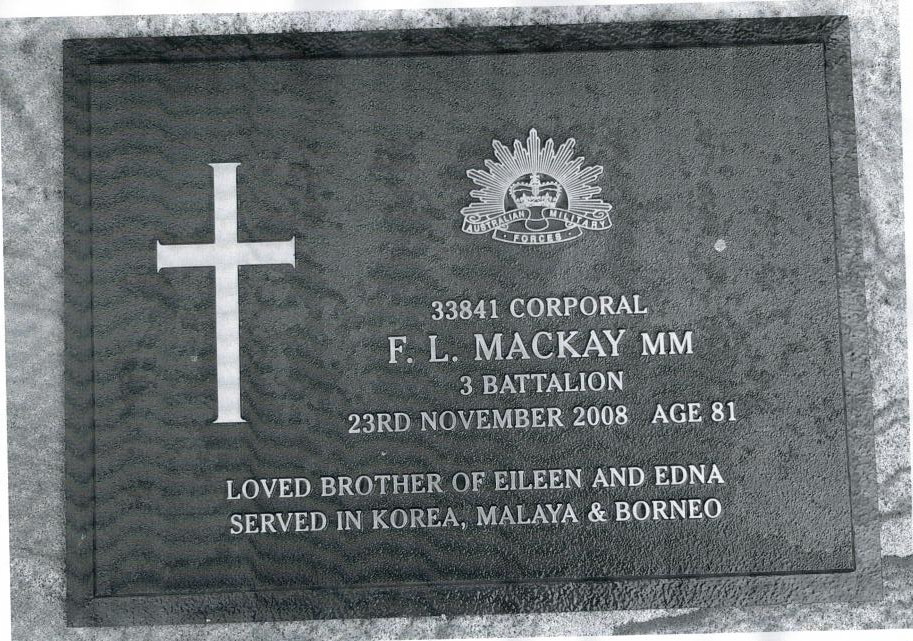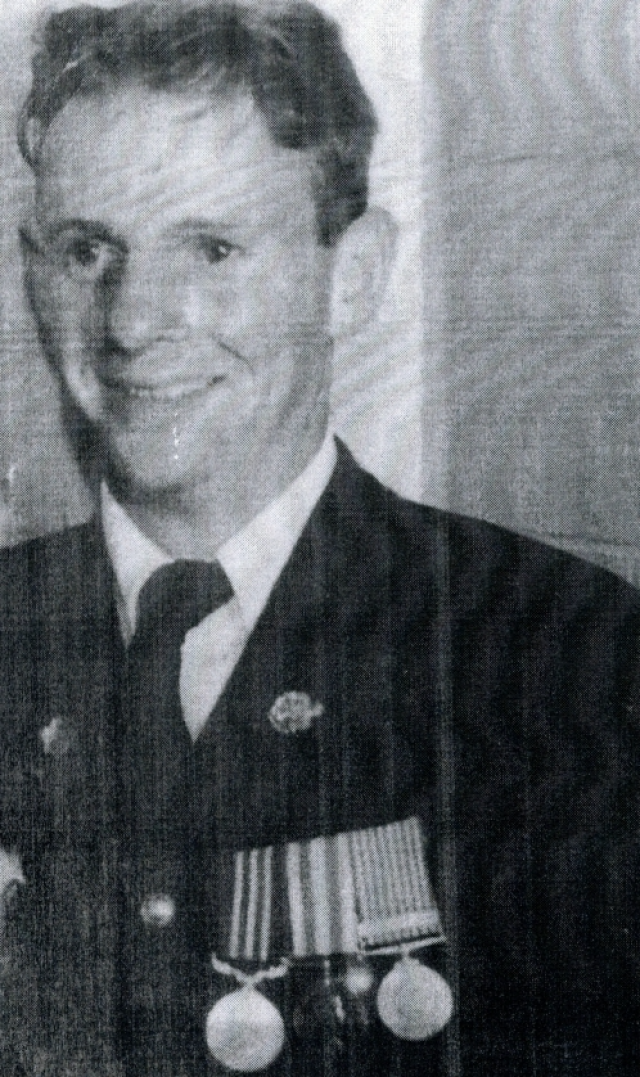It was on the night of 24 January 1953, in the steep, cold area of Korea that a patrol from A Company, 3rd Battalion of the Royal Australian Regiment, that around 30 soldiers were sent on a mission to capture an enemy soldier in an attempt to gain information on the movements of other Chinese patrols in the region.
The 30 men were dispatched in groups of 13 and they ran into a large patrol of the enemy that resulted in a fierce battle to control the strategic positions of the mountainous terrain that such conflicts were fought in.
In the fierce battle that took place, it was estimated that the Australian patrol took out around 80 of the enemy from artillery fire and hand-to-hand fighting. In the thick of the action, former Warwick man Frank Mackay showed outstanding bravery while leading one of the Australian patrols, and although wounded himself, routed the enemy and for this heroic action, resulted in him being awarded the Military Medal for his action on that night.
The award stated: “For aggressiveness, quick decision under difficult conditions when assisting a neighbouring patrol encircled by enemy forces”.
Francis Leo Mackay’s story began when he was born on 28 July 1927 at St. Margaret’s Hospital, Darlinghurst, New South Wales, the son of George Mackay and Bridget Vera McNamara.
Before the family moved to the Northern Rivers town of Coffs Harbour, Frank spent his early life living at Karora in a log cabin where George had cleared the land to establish a banana plantation. Later, the family moved into High Street Coffs Harbour, where Frank attended the Coffs Harbour primary school and later the high school. He proved to be a brilliant academic student, but school attendance appeared to be a problem for Frank, so he left after Year 10 and went working around the area’s banana plantations doing odd jobs and handyman work, until he found his true calling in Army service life.
Frank proved to be a very competent soldier after enlisting into the Australian infantry at 19 years of age on 11 June 1946 and after initial training, was posted to the 3rd Battalion, Royal Australian Regiment.
Frank saw service in Japan with the Occupation Forces from 11 June 1946 until 3 March 1949, and was seconded to the British Army Special Force in Japan from 15 August 1950 until 16 January 1952.
Now a seasoned veteran of the Australian army which he had re-enlisted into, Frank was quick to volunteer into the Special “K” force for service in Korea where the United Nations helped defend the Republic of South Korea, when the communist North Korean forces moved across the 38th parallel in defiance of the United Nations.
As mentioned earlier, from July 1952 to 20 April 1953, Frank served in Korea. It was while he served in Korea that Frank earned the reputation of a highly efficient soldier and greatly feared by the North Koreans who reportedly put a price on his head. His mates in his unit saw him as a quiet, unassuming man but in the heat of combat he was quoted in the Coffs Harbour Advocate on 10 February 1953 as: “He was a ferocious fighter when aroused, but quiet and unassuming normally”. Frank and his unit were also highly respected by the American forces in Korea and the unit was awarded the United States Presidential Unit Citation.
Frank was now classed as a professional soldier, and with his combat service he was posted to the 28th Commonwealth Brigade with the 2nd battalion Royal Australian Regiment and served in the Malayan Emergency in Perak, Malaysia, from 8 October 1955 to 20 November 1957. He was mainly involved in jungle patrols and guarding military installations.
In 1958, his records show that he enlisted in the Royal Australian Air Force after his discharge from the army and served throughout the 1960s in counterintelligence. After leaving the regular Army, Frank served with the Citizens Military Forces later, before leaving the services and moving into the unfamiliar life of trying to seek employment.
At this stage of his life, Frank became a bit of an enigma as he never really returned to a stable home life; in fact, his family lost contact with him for many years as they did not even know that he joined the army a second time, and it was only when his photo appeared in a Melbourne newspaper, stating that he was a war hero that they renewed contact.
His father George had passed away while Frank was serving overseas so he became a bit of a drifter, never married, and although he had many female friends it never led to marriage. According to members of his family, he was a highly intelligent man, well-read, and able to perform any tasks.
He became a bit of a handyman working in places out west and occasionally returning to live with his sisters Eileen or Edna. He appeared to turn up in towns from Melbourne to Innisfail, and when he was staying in Warwick, he had a massive stroke and was in a retirement home in Warwick before suffering a heart attack and passing away on 23 November 2008.
Frank Leo Mackay was given an RSL funeral and now lies at rest in the Soldier’s section of the Warwick War Cemetery.
He was a complex character who had a restless spirit and perhaps it could be said, that when at the age of 10 years he was informed that he was born illegitimate and that his step-father George, had adopted him. This could have had some emotional effect on him as it was possibly a heavy burden to carry for one so young.
Another effect could have been witnessing, and losing, his younger brother Alexander, when he was hit by a car at the age of two when the family visited Sydney. One major factor was possibly his war experiences in Korea which could have resulted in Post Traumatic Stress Disorder (PTSD), which has only become an issue in the military of late.
However, Frank found his calling and ‘family’ in the armed forces and proved to be an outstanding soldier who enjoyed the mateship and independence that this life offered. The Sunday Sun newspaper probably summed this up when on Saturday 7 February 1953 the said:
“Corporal Francis Leo Mackay who had been awarded the Military Medal was on an 18-man patrol when he went to the aid of another patrol encircled by the enemy. During the fight that followed, Mackay commanded one group that killed four enemies in hand-to-hand fighting, and later, controlled the evacuation of the wounded from the ambushed patrol. He then went to help his national commander”.
Francis Leo Mackay may have been a complex man but he had a very likeable personality well liked by his family, and his military career definitely placed him in the higher echelon of Australia’s Anzacs, where he will always be remembered as a decorated hero in the annals of Australia’s military history.
LEST WE FORGET.









